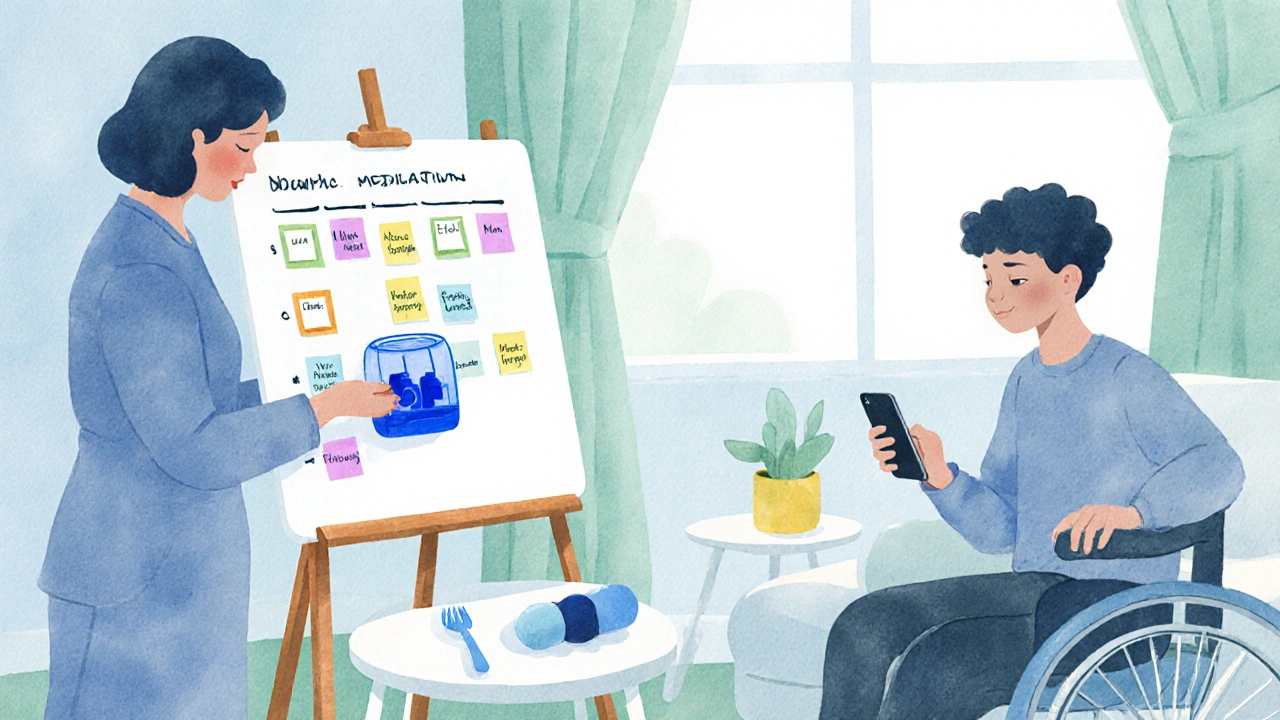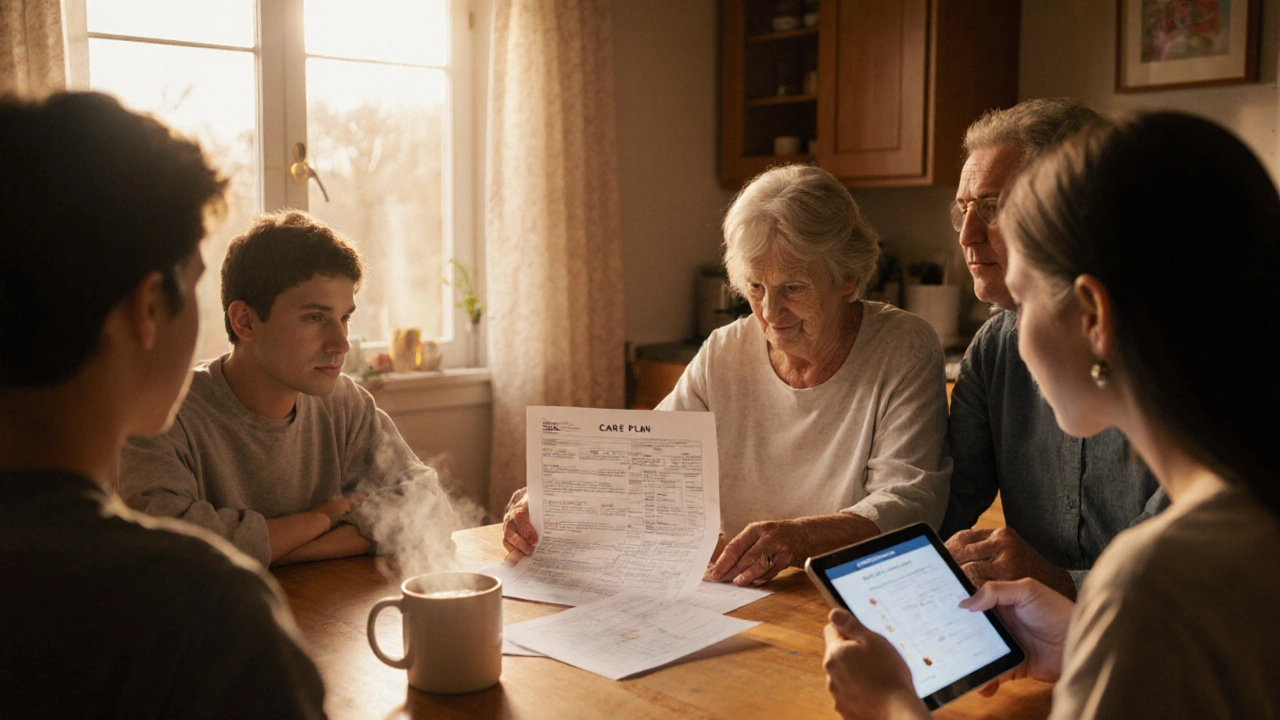Parkinson's Caregiver Support Planner
Family Support Overview
Caregiver:
Secondary Support:
Family Members Involved:
Weekly Routine
Check-In Time:
Medication Reminder System:
Support Group:
Caregiving Responsibilities
Intimacy & Communication
Communication Style:
Physical Considerations:
Did you know that about 10% of households with a Parkinson’s diagnosis report major strain on their relationships within the first two years? Navigating love, duties, and daily life when a loved one faces this progressive condition isn’t easy, but it’s far from impossible. Below you’ll find practical ways to keep the bond strong, protect your own well‑being, and turn challenges into shared growth.
What is Parkinson's disease?
Parkinson's disease is a neurodegenerative disorder characterized by tremor, stiffness, slowness of movement, and balance problems. It typically appears after age 60, affects roughly 1% of people over 60, and progresses at varying rates depending on genetics, lifestyle, and treatment adherence.
Because the brain changes affect both motor and non‑motor functions, the impact spreads far beyond the individual-into every corner of family life.
The ripple effect on close relationships
Spouses often become primary caregivers, juggling work, household chores, and emotional support. Children may feel they have to grow up quickly, while aging parents can struggle with shifting roles. Recognizing each person’s experience is the first step toward balance.
Key emotions that surface include grief over lost independence, frustration with unpredictable symptoms, and fear of the future. When unaddressed, these feelings can snowball into resentment or withdrawal.
Communication strategies that actually work
Open, honest dialogue is a lifeline, but it needs a framework to stay constructive. Try these approaches:
- Scheduled check‑ins: Set a regular 15‑minute “family meeting” to discuss concerns, schedule changes, and successes. Predictability reduces anxiety.
- Use “I” statements: Replace blame (“You never help”) with personal feeling (“I feel overwhelmed when I handle the meds alone”).
- Active listening: Mirror back what you heard before responding. It shows respect and avoids misunderstandings.
- Pick the right moment: Choose times when symptoms are mild and everyone is rested. A tense morning may lead to misinterpretation.
These tactics, supported by family communication research, improve relationship satisfaction by up to 30% in chronic‑illness households.

Intimacy and physical changes
Sexual intimacy often takes a hit because of rigidity, fatigue, or medication side‑effects. The good news: many couples regain a fulfilling sexual life with adjustments.
- Talk about fears openly; silence fuels insecurity.
- Experiment with positions that reduce strain-use pillows or chairs for support.
- Consult a urologist or therapist for medication tweaks that may improve libido.
- Focus on non‑penetrative intimacy (massage, cuddling) to maintain closeness.
Remember, intimacy isn’t just physical; emotional connection through shared hobbies or simple eye contact matters just as much.
Sharing caregiving duties
When the spouse bears 80% of the caregiving load, burnout rates soar. Distribute tasks based on each person’s strengths:
- Medication management: Use a pill organizer and set alarms; the tech‑savvy teen can handle the app.
- Mobility assistance: A sturdy mobility aid like a roll‑ator can be shared, reducing the physical strain on any one person.
- Household chores: Break tasks into 10‑minute bursts; rotate responsibilities weekly.
Documenting a simple schedule on a whiteboard or shared digital calendar keeps everyone on the same page and minimizes forgotten duties.
Leverage external support
No family should feel isolated. Here are proven resources:
- Support groups: Local Parkinson’s Australia chapters offer monthly meetings where families exchange tips and emotional support.
- Therapy: Couples counselling trained in chronic‑illness dynamics can teach coping tools and rebuild trust.
- Home health aides: Part‑time assistance during peak symptom times can give primary caregivers a vital break.
- Online forums: Platforms like Parkinson’s Foundation’s community page allow 24/7 peer advice.
These support group connections have been linked to lower depression scores and higher perceived quality of life for both patients and partners.

Practical tools and daily routines
Small adjustments can dramatically smooth daily life:
| Challenge | Suggested Strategy |
|---|---|
| Medication timing errors | Use a smart pill dispenser synced with phone alerts. |
| Stiffness during morning routine | Incorporate 5‑minute seated stretches before getting up. |
| Feeling isolated | Join a weekly virtual support group or local meetup. |
| Unpredictable tremor during meals | Use adaptive utensils with weighted handles. |
Other tools worth considering include medication reminder apps, voice‑activated assistants for hands‑free calls, and ergonomic kitchen equipment.
Quick‑reference checklist
- Schedule a weekly family check‑in.
- Set up a medication alarm system.
- Identify at least two external support resources.
- Divide caregiving tasks and write them on a visible board.
- Plan one non‑medical activity each month to nurture the relationship.
Frequently Asked Questions
How can I talk to my partner about losing independence?
Pick a calm moment, use gentle “I feel” language, and acknowledge their fear. Emphasize that needing help doesn’t mean they are a burden, and propose concrete ways you can share tasks.
Are there specific therapies that help relationship stress?
Yes-couples counseling that focuses on chronic illness, cognitive‑behavioral therapy for anxiety, and occupational therapy for joint activity planning have all shown positive outcomes.
What should I look for in a support group?
A good group offers regular meetings, a mix of patients and family members, and a facilitator knowledgeable about Parkinson’s. Online options are valuable if travel is difficult.
Can medication adjustments improve intimacy?
Sometimes. Discuss side‑effects like erectile dysfunction or libido changes with your neurologist; they may adjust dopaminergic therapy or add a partner medication.
How do I prevent caregiver burnout?
Take regular respite breaks, keep up with personal hobbies, maintain a social network, and consider professional respite services. Tracking your own mood in a journal helps spot early signs of overload.


Comments
Karen Richardson
While the article covers many useful strategies, it's worth emphasizing that scheduling medication reminders with a smart dispenser can reduce timing errors by up to 70 %. Using a shared digital calendar also ensures every family member knows the daily tasks, which prevents overlap and forgotten duties.
October 5, 2025 AT 17:36
AnGeL Zamorano Orozco
Honestly, I cant believe how many people just gloss over the sheer emotional toll this disease rips on families! The constant anxiety, the sleepless nights, the feeling that you're drowning in a sea of appointments – it’s a nightmare that most of us never signed up for, yet we’re forced to live it day after day. And then there’s the so‑called “support groups” that are often just a polite gathering of strangers sharing the same misery, which feels more like a rehearsal for a tragedy than any real help. You think you’ll find relief, but instead you get more stories about tremors at dinner, about rigidity during a hug, about the dreaded “off” periods that turn simple chores into Herculean tasks. It’s infuriating, it’s exhausting, and it’s absolutely overwhelming – not to mention the financial strain that sneaks up on you while you’re trying to pay for meds and therapy. The article mentions using adaptive utensils, but what about the hidden cost of constantly replacing equipment that wears out? And the whole idea of “scheduled check‑ins” sounds great on paper, until you realize that the person you’re trying to check in with might be too fatigued to even respond. I’m not saying it’s hopeless, but the reality is raw, gritty, and often ignored by those who sit comfortably behind a keyboard.
October 7, 2025 AT 16:11
Cynthia Petersen
Oh sure, just pop a pill, schedule a meeting, and love will magically stay the same – because relationships never change, right? In reality, though, the little things like a shared joke about the morning coffee or a quick text saying “I’ve got your back” make the difference between a silent dinner and a night filled with real connection.
October 9, 2025 AT 14:46
Jai Patel
Look, adding a few bright‑colored sticky notes on the fridge can turn a chaotic schedule into a visual rhythm that everyone follows. Pair that with a quick family huddle each evening, and you’ll see the stress levels drop faster than you think.
October 11, 2025 AT 13:22
Zara @WSLab
👍 Great tip on using weighted utensils – they really help steady the hand during meals. 🍽️ And don’t forget to celebrate the tiny wins, like a smooth‑sipping coffee without spilling! 🎉
October 13, 2025 AT 11:57
Dominique Lemieux
The premise of orchestrating a caregiving ecosystem often masquerades as a simple checklist, yet it is essentially an intricate ballet of timing, emotions, and logistical precision.
First, the allocation of tasks must respect individual capacities, because overburdening the primary caregiver inevitably accelerates burnout.
Second, the reliance on technology, such as smart pill dispensers, introduces a dependency that can backfire if the system glitches, so a manual backup plan remains indispensable.
Third, the psychosocial dimension cannot be reduced to mere “support groups”; genuine therapeutic benefit arises when families engage in structured narrative sharing, which allows each member to voice grief without judgment.
Fourth, the notion of “scheduled check‑ins” demands strict adherence, for otherwise the ritual loses its anchoring effect and devolves into another source of stress.
Fifth, consider the role of external professionals – a part‑time occupational therapist can redesign the home environment, reducing the physical strain on everyone.
Sixth, the financial ramifications deserve a distinct line item in any plan; overlooking medication subsidies or tax deductions leads to avoidable economic strain.
Seventh, cultural expectations often dictate who should assume the caregiver mantle, and confronting those expectations can either empower or fracture family dynamics.
Eighth, intimacy, both physical and emotional, must be reconceptualized as a spectrum, where non‑penetrative closeness like shared reading or gentle massage retains relational intimacy when sexual function wanes.
Ninth, documentation, such as a living spreadsheet accessible to all family members, transcends the vague “whiteboard” approach by providing timestamps, task completion status, and accountability.
Tenth, resilience training, perhaps through mindfulness sessions, equips caregivers with a mental buffer against the relentless waves of frustration.
Eleventh, the very language used in daily interactions reshapes perception; swapping “I have to” for “I choose to” subtly recasts the narrative from burden to agency.
Twelfth, the iterative nature of the plan cannot be overstated – periodic review meetings ensure that emergent symptoms or new resources are promptly integrated.
Thirteenth, the ethical dimension of respecting the patient’s autonomy while safeguarding safety requires a delicate equilibrium that families must constantly negotiate.
Finally, remember that no plan is flawless; the ultimate metric of success is whether the family feels a shared sense of purpose rather than isolated duty.
October 15, 2025 AT 10:32
Christopher Munt
It’s amazing how a quick 5‑minute stretch each morning can loosen stiffness and improve mood. 😊 Keep the routine light and consistent.
October 17, 2025 AT 09:08
Mike Creighton
When the tremor steals the simple act of tying a shoe, it feels like the world is conspiring against intimacy; yet by redefining love as shared laughter over a mismatched pair of socks, we reclaim the narrative.
October 19, 2025 AT 07:43
Desiree Young
Family schedules thrive on clarity, not chaos.
October 21, 2025 AT 06:18
Helen Crowe
Building on the detailed checklist, I’d add that incorporating a rotating “task champion” each week ensures no single person feels perpetually trapped in the same role, which aligns with the resilience training you emphasized.
October 23, 2025 AT 04:54
Anthony Aspeitia-Orozco
Remember, small gestures like a heartfelt note left on the fridge can reinforce the sense of teamwork you described, keeping morale high during tough weeks.
October 25, 2025 AT 03:29
Adam Dicker
Exactly – when the calendar is crystal clear, everyone knows their part, and the stress drops dramatically.
October 27, 2025 AT 01:04
Molly Beardall
Honestly, the whole “check‑in” concept feels like corporate jargon forced onto a deeply personal crisis; it’s a hollow exercise that pretends to solve what it rarely touches.
October 28, 2025 AT 23:39
Brian Pellot
I’ve seen families thrive when they treat the schedule like a game, rewarding completed tasks with a favorite snack or a short movie night.
October 30, 2025 AT 22:15
Patrick McCarthy
Keeping things simple works best use a shared phone calendar and color‑coded events for meds chores and fun time
November 1, 2025 AT 20:50
Geraldine Grunberg
What a wonderful reminder!!! 📅✨ Never underestimate the power of a well‑organized planner!!! It brings peace, clarity, and a sense of control!!!
November 3, 2025 AT 19:25
Elijah Mbachu
For those who prefer quiet, a single nightly journal entry can capture concerns without the noise of group discussions.
November 5, 2025 AT 18:01
Sunil Rawat
Try setting a gentle alarm on your phone for medication times; a soft tone can be less startling than a loud buzz.
November 7, 2025 AT 16:36